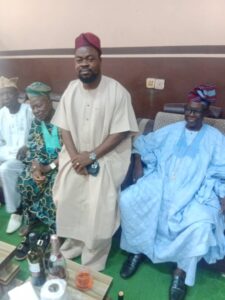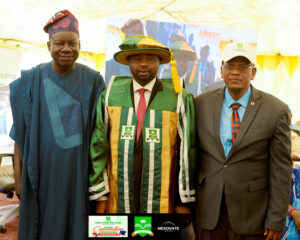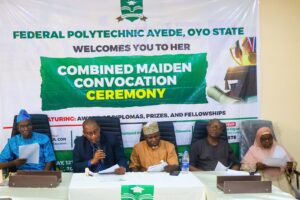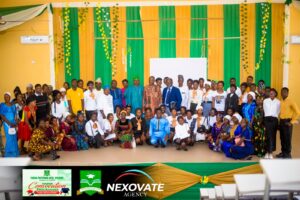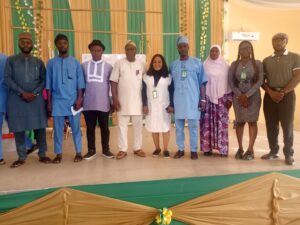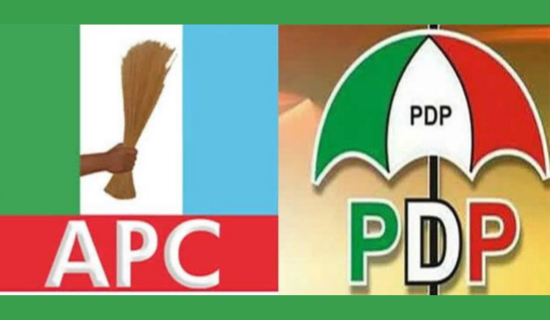
By Olumide Paul Akomolafe
Political analysts and Nigerians alike are interested in learning what would happen to the All Progressives Congress (APC) in Southwest Nigeria as the country approaches the general elections of 2027. The party is well-established in states like Lagos, Ogun, Ondo, and Ekiti, and there is much conjecture about its chances of maintaining its supremacy.
Since election results can be greatly influenced by the advantage of incumbents. If the current governors of Southwest Nigeria, appointed by the APC, keep up their good work and fulfil their commitments, the electorate might be on their side. Maintaining the party’s control will require them to build on their accomplishments, attend to the demands of the populace, and implement meaningful policies. Gaining the confidence and votes of the electorate will be largely dependent on the record of governance and observable development.
The APC’s future success will be largely dependent on its internal dynamics and unity. A cohesive party can efficiently plan, mobilise resources for election campaigns, and put up a strong face. In terms of its chances of winning elections in 2027, the APC’s capacity to handle internal strife, promote diversity, and take into account different interests will be crucial. The party will be more appealing if its members are cohesive.
improve its stance against rival parties and appeal to the voters.
For opposition parties to challenge the APC’s hegemony in Southwest Nigeria, their tactics and strength will be essential. In order to effectively convey their alternative agenda to the electorate, the opposition must field credible candidates and offer appealing views. One of the biggest threats to the ruling party could come from a cohesive, well-organized opposition that can forge strategic partnerships. Success of the opposition parties will be largely determined by their capacity to take advantage of the weaknesses in the APC and appeal to the hopes of the populace.
Thus, politics in Southwest Nigeria ahead of 2027 General Elections may be influenced by socioeconomic issues and public opinion. It is imperative that the electorate assesses how well the APC has performed in tackling issues like infrastructure development, unemployment, healthcare, and education. Public opinion will be influenced by the party’s capacity to exhibit inclusivity in the making of policies and responsiveness to the needs and ambitions of the populace. Further socio-economic variables that could affect voting patterns include changes in the population, relationships between different ethnic groups, and regional attitudes.
Before the next election cycle, there is a lot of conjecture that Sen. Ademola Adeleke and Engr. Seyi Makinde of the People’s Democratic Party (PDP) in the states of Osun and Oyo, respectively, have thought about joining or defecting to the All Progressives Congress (APC).
The way these two governors in Osun and Oyo states perform will be a major factor in their choice to leave the party. These governors may use the APC as a platform to consolidate their accomplishments if they have effectively put into effect significant programmes, met developmental milestones, and won over the public.
One reason for the political calculations around possible defections could be a desire to identify with the national ruling party. The duo may be able to obtain resources, gain more political clout, and work with the federal government if they join the APC.
Another motivating element would be their personal goals in each of the two states. They might think about defecting to the APC in order to get a perceived edge in accomplishing their objectives if they are hoping to be re-elected or have ambitions for higher political offices, such as the Senate Seat.
Nonetheless, the PDP would suffer a great deal if the two governors in Osun and Oyo states defected. Losing the current governors would make the PDP less powerful in these states and might make it more difficult for it to mount a stiff resistance to the APC. In addition to potentially weakening the party’s general cohesiveness and strength, the exit of these governors may result in the loss of seasoned leadership.
As a result of the potential defection of the governors, Osun and Oyo states, they would increase the reach and chances of the ruling party in elections. It would show that the APC is capable of luring well-known politicians from rival political parties, enhancing its prospects of winning elections in the area and solidifying its position of power. In the states affected, the APC’s ability to rule and implement policies may be strengthened by the inflow of experienced governors.
Meanwhile, voters’ responses in the states of Osun and Oyo will be very important in determining how possible defections turn out. While some people would see the defections as self-serving or opportunistic, others might see it as a calculated move to further the goals of the ruling party and bring about progress. Voters’ responses will vary depending on a number of variables, such as how well they believe the current governors are performing, how much faith they have in the political system, and their political affiliations.
The APC might become even more dominant, which could change how the two main parties share power. In order to fill the leadership void left by the outgoing governors and restore the PDP’s standing as a strong opposition force, planning and restructuring would be necessary.
Thus, the possibility of PDP governors in Osun and Oyo states defecting to the APC in advance of the 2027 elections underscores the fluidity of Nigerian politics and the pursuit of political benefit. A number of considerations, such as political calculations, personal goals, and government performance, will influence these governors’ judgements. Their defections will have a profound effect on both parties and the political landscape in the states they influence. Voters will be pivotal in determining the ultimate effect of these possible defections on the 2027 election results as the political environment changes.
So, Southwest Nigeria’s general elections in 2027 will provide the APC a chance to either maintain or erode its lead in the zone. It will be crucial for the party to be able to make the most of its incumbency advantage, keep internal harmony, deal with socioeconomic issues head-on, handle opposition dynamics, and interact with electorates. The electoral results will also be influenced by the tactics and power of the opposing parties, public opinion, and socioeconomic variables.
Olumide Paul Akomolafe
Journalist/Political Analyst works at Federal Polytechnic Ayede
olumide0087@gmail.com


